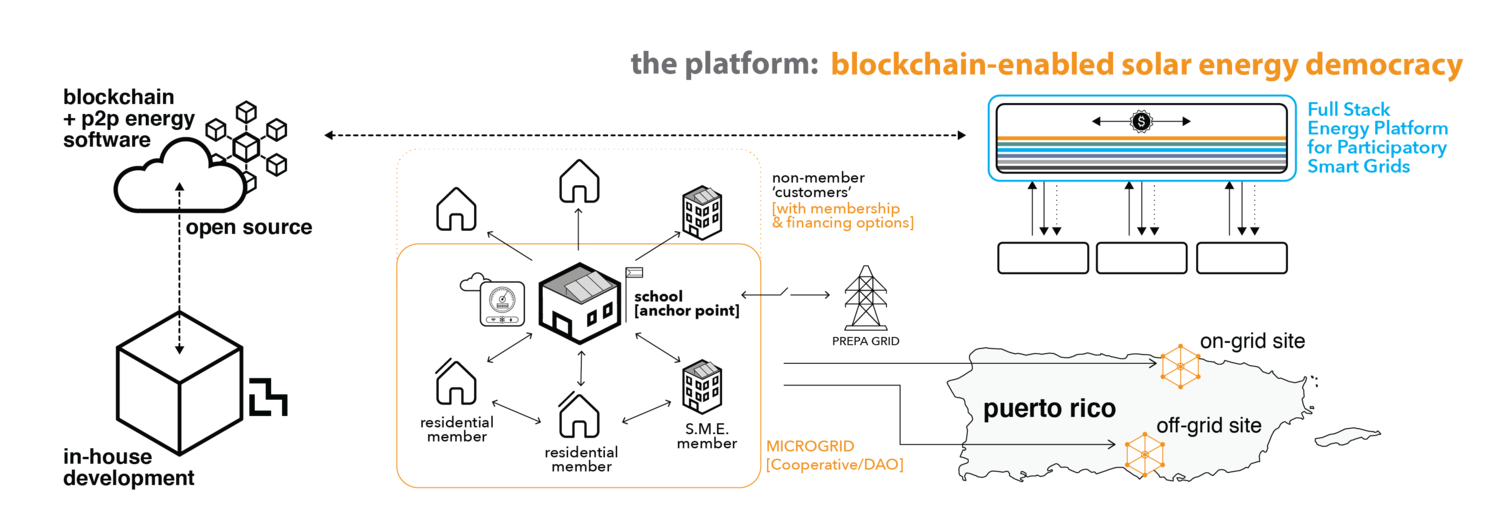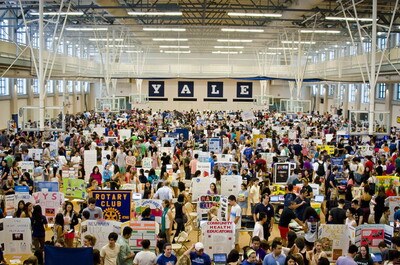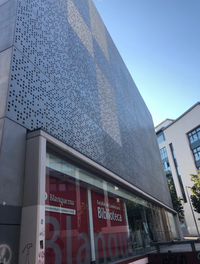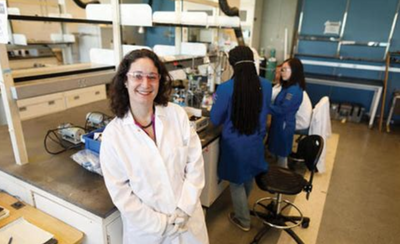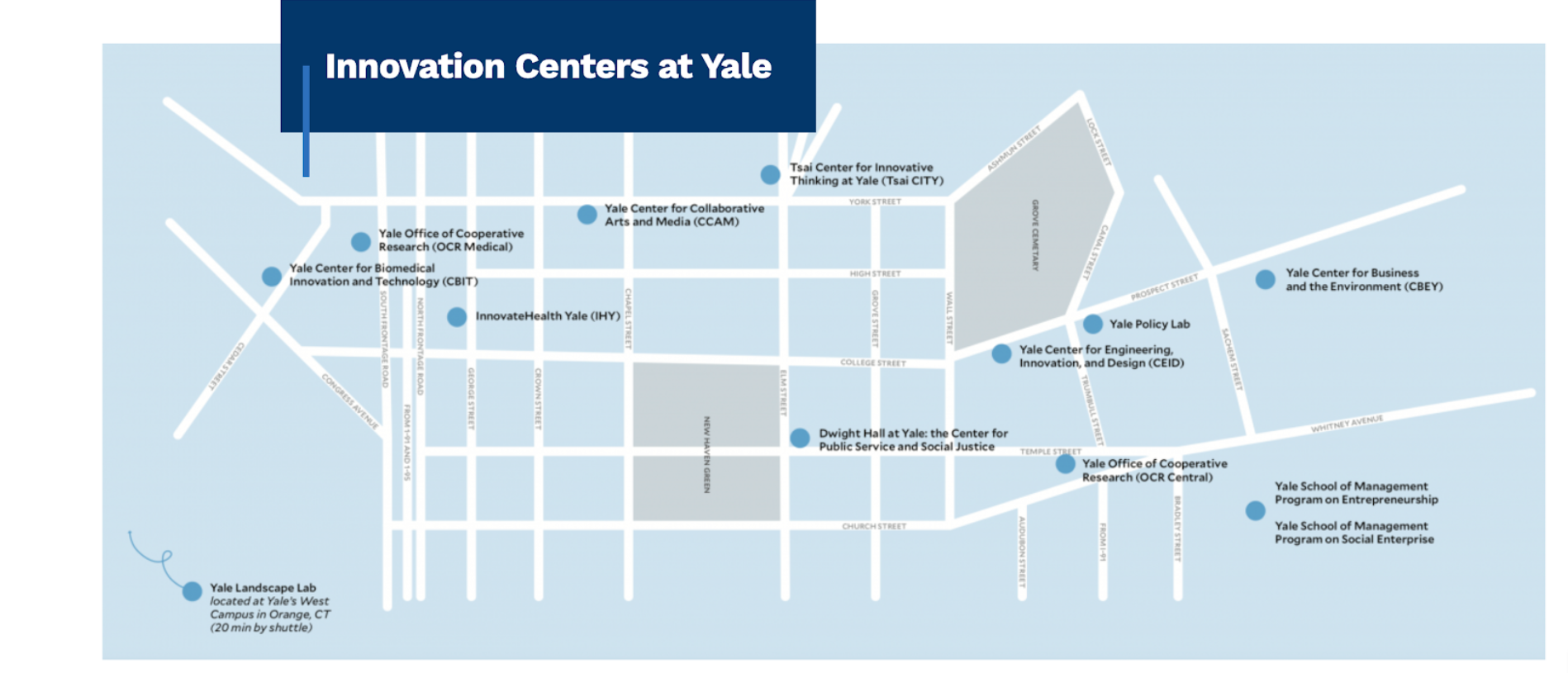A Student’s Guide to Sustainability-Tech Innovation at Yale
A brief summary of the resources at Yale

Want to create a solution or product? Navigating the entrepreneurial experience can be very complicated, but fortunately, at Yale there are a number of centers, programs, and people dedicated to supporting our innovative community, which means there are plenty of resources to help those who are motivated to work on a problem! In the context of Covid-19, navigating resources can become even more challenging, but many of the centers and organizations remain open and dedicated to keeping the spirit of the community alive.
I am a fourth-year undergraduate Mechanical Engineer and Energy Studies Scholar, and I am involved at CBEY as the Sustainability and Technology Programming Coordinator. A lot of my focus at Yale has involved work at the Office of Sustainability, Engineering School, Center for Innovation, Engineering and Design (colloquially known as the CEID), Tsai CITY, and CBEY, and one of my main goals has been to help expand the sustainability, innovation, and technology culture at Yale. This blog post is a brief compilation of the wisdom I have learned at Yale, along with the wisdom of other innovators who have utilized some of the spaces, programs, and courses we have on campus. As a first-year, getting involved with innovation was pretty intimidating, but hopefully, this guide can illustrate that there are many opportunities to take part, and it’s never too late to get started.
Goals of this post:
-
Provide an outline for the innovation pathways at Yale and highlight information on how to navigate them.
-
Provide resources, insight, and advice on funding, projects, and the innovation community.
PRE-IDEA STAGE: Motivation + Inspiration
If you don’t yet have an idea, but would like to explore some specific fields or topics, there are Intensives and other forms of Programming that can help you find like-minded individuals as eager to get to work as you are, along with providing a great chance to learn more about challenges in the field your interested in and ways to develop solutions to those challenges outside of the classroom setting. These programs are great chances to get inspired.
Intensives
Consider applying to the CITY intensives, some of which have included programs co-sponsored by CBEY such as “Data for Impact 101” and the “Climate Change Solutions Generator.” These intensives are an excellent opportunity to explore topics of your interest in a project-oriented environment with people who may very well become your co-founders or partners in endeavors beyond the intensive.
Personally, I participated in the P2P Blockchain for Solar Microgrids intensive in 2018. It gave me an opportunity to learn and apply my knowledge of blockchain in a context that was important to me, and I was able to meet some awesome folks, like Jonathan Simonds from Symbrosia, during the intensive. After the intensive, Martin Wainstein continued the project in partnership with MIT, and the team eventually traveled to Puerto Rico with the concept of the P2P Blockchain Microgrid.
Other Programming
There is a lot of other programming at Yale. Try to stay in the loop of the many events on campus that may just help spark an idea for you or hone new skills! These are great moments to learn about successful entrepreneurs and explore ideas that can help you on your journey.
Check out the CBEY, Tsai CITY, CEID, and Eship@Yale calendars.
Pro-tip: These events are also a great time to crank out a journal and jot down notes and questions that help you come up with new ideas. An idea journal is something that is always recommended, and many great thinkers, inventors, and entrepreneurs had them (such as Leonardo Da Vinci, Marie Curie, Thomas Edison, and Albert Einstein!)
{smaller sidenote} Also consider taking courses that work towards skills in innovation, entrepreneurship, or design. Some upper-level classes that explore these topics in a project-oriented setting include ENAS 400: Making It; and ENVE 360: Green Engineering and Sustainable Design.
Keep a lookout for workshops at the centers that can also help you build and explore new skills, such as the Innovator’s Toolkit series at Tsai CITY. Among the centers you can find workshops for Computer-Aided Design; Graphic Design; Coding and Website Development; and so much more! The easiest way to stay informed about these opportunities is to become a member of the centers (the CEID and CITY are two centers that membership is highly recommended for - becoming a member means 24/7 access and notifications of events firsthand). Get on the panlists of centers and organizations that are of interest to you.
Clubs/Groups
A list of sustainably-oriented + tech-oriented extracurriculars is available here. Getting involved with the numerous groups on campus is one easy way to get acquainted with the different spaces and resources at Yale.
Independent Research can be an opportunity to explore topics of interest related to your entrepreneurial innovation in-depth.
Personally, As part of my summer in 2018, I spent three weeks in Barcelona, Freiburg and Zurich studying the relationship of sustainability habit and culture formation to sustainable infrastructure, which was research funded by Tsai CITY and the Energy Studies Program. This helped me think of my technical solutions from a systemic point of view, and helped me expand beyond the interests I had previously had.
This is one of the ways programs and centers can support endeavors. And there are also funds for attending conferences, events and more.
Laboratory/Center-Based Research and Work are opportunities that can broaden your experience in a field of interest. Some jobs/projects/ research topics also involve components that can transform into entrepreneurial ventures, such was the case for startups like Simplex Sciences, which was born out of a biochemistry lab at Yale. Check out the student employment website to look for posted opportunities, such as writing positions or research assistant positions. To look through current research opportunities more directly, the Yale Undergraduate Research Association (YURA) posts research position listings and has a database that enables you to search for faculty that match your specific topics of interest. Check that out here.
Tip: If you find a lab or center whose work you would like to be involved in, don’t be afraid of cold-emailing or setting up a meeting to explore more opportunities.
IDEA & IDEATION
So what about when you are at the point where you have an idea and want help refining it or seeing it through? Try talking to some of the awesome mentors on campus that have open hours for you to talk to them. This can be one of the most affirming steps to making your idea a reality, and it is also one of the easiest ways to be directed to further resources! Here are a few of the current individuals that would be great to contact.
CBEY’s Mentorship
Mentors at the Center for Business and Environment can offer a range of advice on questions related to sustainability, environmental science, and its intersection with entrepreneurship (as well as opportunities along this pathway). To reach out and contact mentors and advisors within CBEY, go here: https://cbey.yale.edu/learning/mentorship-advice
Tsai CITY Mentors-in-Residence
Mentors at the Tsai Center for Innovative Thinking are available for advising sessions for students from across campus. To acquaint yourself with the mentors and sign up for office hours, go here: https://www.city.yale.edu/office-hours
MAKING IT HAPPEN: PROTOTYPING | FUNDING
Once you’ve figured out a topic or field of interest there are a few things, spaces, and places you could explore.
For all programming and a holistic view of many of the resources and centers at Yale, check out the Entrepreneurship Collaborative. At Yale there exists a network of centers, programs, labs, and initiatives under the umbrella of the Yale “Entrepreneurship Collaborative”. The Yale Center for Business and Environment is part of this network, and the majority of the programming and funding for innovation stems from the places within the Collaborative. There is also a working document for the centers/initiatives/project and people penned for sustainability here.
Prototyping
Becoming a member of a maker-space like the CEID means that you have the ability to prototype physical concepts as quickly as you can imagine them. 3D-printers, laser cutters, metal, and wood machining tools, and the staff that operates the center, all make this process a lot simpler. You can start that process by clicking here.
If the solution you have in mind does not necessarily require a physical product, it is still important to get the concept documented in a way that pushes you towards the next step of testing the concept, getting funding, and making the idea happen.
Funding
Funding is a crucial part of lifting any idea off the drawing board. Fortunately, Yale has a number of in-house fellowships, awards, and funds, as well as resources to connect you to external funds.
- Grant Competitions and Funding Opportunities
Fellowships
- Fellowships are unique in that they combine opportunities for mentorship with a close-knit community as well as financial support for an endeavor. This is especially helpful for those who are ready to pursue an idea/solution head-on. Some of the fellowship opportunities do not even require a fully formed idea, and others are intended for those at seed stage or further along.
These are just a few of the examples of the fellowships and funding opportunities at Yale. The best places to look for additional fellowships are via the Center for International and Professional Experience, the CBEY, CITY, and Entrepreneurship Across Yale sites. Beyond that, the majority of people find fellowships and through reaching out to faculty, mentors, and peers at the different centers and departments of Yale. The most important takeaway from this guide is to read up and reach out. Ultimately, while you are on the innovation path, the best thing you can do is get to know people and learn from others. Reach out and ask questions to professors, friends in your classes, and all of the mentors and people working at the innovation centers on campus. It is one of the immense privileges of Yale to have access to so many diverse resources and also be connected to a community of people who have similar ambitions and different experiences. Come to the Yale Center for Business and Environment, show up to events, and don’t be afraid to ask questions!
